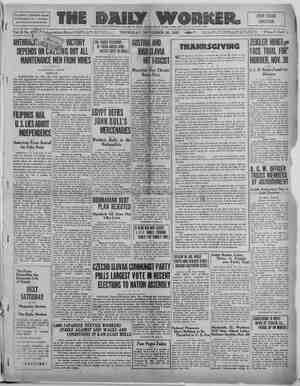The Seattle Star Newspaper, November 26, 1925, Page 25
You have reached the hourly page view limit. Unlock higher limit to our entire archive!
Subscribers enjoy higher page view limit, downloads, and exclusive features.
@ wecond and Columbia Sts, THURSDAY, NOVEMBER 26, 1928, a San little time ago—hm. about 364 da in f angling, gawky, tb y fellow stalked anch between the At cific oceans. Ho went out to visit his pet fowl No, childrep, it wasn't a chieken and | thir t wasn't a duck—it was « turkey to And the lit pet | things and I Now this old man, known as “Uncle fam, otherwise got t T IS but a few years ago that the entire ical aspect of a bank’s interior was pletely changed. Soothing indirect lightir is replaced dingy lamps; steps and obstruction disappeared; creating an atmosphere of warmth and \y liness. Old formalities and old customs are c ; The officers are now out in front, where patre prospective customers may confer with them. This change of attitude from one of aloof: one more human and friendly, constitutes \ probably the greatest reason for the enormous inc ness. to deposits and number of depositors.. The transforma what is had a decided psychological effect on the people. of Americans who never went to a bank now matter of course, to be greeted with courtesy an rease in tion has Millions ity. They are learning how completely their } go ag a d sincer- bank can serye them. The First National Bank shows its since ton to the small deeositor as to the ; advice when tt is solicited and material assistan ranted. We want you to knou that we have the render you complete service where financial problema are rity by giving as by of SEATTLE * . And Now, Children, This Is How|Cheery Greeters Py. Your Uncle Sam Gets the Turkey ‘st National Bank . festern Washington _ herons [ar we ving —|H key t can wel j } serpy WHE Meee bth beat ote | tt seat a sec! “Thanks Lots for Thanksgt wnt Giving al Cochran E HONEST and fair, and consider a bit The good that you get out of living. The world, after all, you will have to admit 1" Returns to you more than you're giving. hote : At times you have drunk from the cup of good cheer, A ready and willing partaker, Is it asking too much that you stop, once a year, And give up real thanks to your Maker? ‘OU learn, as you live, that your happiness share If oft’ interrupted by sorrow. But cloudiness clears and the outlook is fair, Thru the sunshine that comes on the morrow. Whatever your lot, life’s the best thing you've got, And, all in all, well worth the living. Consider! You'll see that you've reason to be Sincere in the thanks that you're giving. phd. THe Buildings of the Pacific telephone sys- tem in the State of Washington, grouped as they might be to constitute a modern city, appear in the above picture. Every building in the group is owned by the Telephone Company and is devoted entirely and exclusively-to the transmission of speech. They are all essential in providing a channel of speech from any telephone in this city or state to any other one of 16,000,000 telephones throughout the nation. In value they are less than one-tenth the property and facilities of the Pacifie Company in Washington; with the lands on which they stand they cost $4,272,000, without taking into account a single piece of apparatus which they were erected to house, and without reference to fifty-four other buildings rented by this one telephone organiza- tion in Washington. A City of Service the above buildings may be called. It is an imaginary city only in the grouping of the units which compose it. They are, in aetual fact, widely seattered throughout the state. But they are also, in actual fact, as closely associated through the magic of communication as they appear here to be in physical proximity. This picture of the City of Service does not reveal the four thousand men and women—all residents of the state, each a citizen of the commu- nity in which he or she lives—who construct, main- tain, and operate the telephone system, who give life and reality to the service. i ii HE At the Command of the People of the State of Washington Day and night, year after year without interruption, alert young women and skilled men are on duty in these buildings to connect calls and to insure that your spoken message is successfully | transmitted. { Outside of the buildings, under the ground, along streets and highways, through mountains and countryside, into sky-scraper and modest cottage, men trained in numerous spe- ‘ cialized occupations developed with the progress of telephony are engaged in building, extending, and improving the system of spoken communica- tion for which the central offices serve as nerve centers. Were all of the people employed by The Pacific Telephone and Telegraph Company in the State of Washington to be assembled in one com- munity—such as in this imaginary grouping of” telephone buildings—and were their dependents to be assembled with them, they and their families 7 would alone make a city about the size of Olympia, © the Capital. The homes in which they live, the stores from which they buy, the banks in which they deposit their individual accounts, the professional lf people whose services they require, the amuse-j ments they patronize, the churches and institus) tions they help to support, the civie activities Inv which they engage—all would in turn requir@ other buildings and houses making a far larger city than is suggested by the picture of telephone buildings or than would be produced in counting as population merelye the telephone men an women and their families. 4


